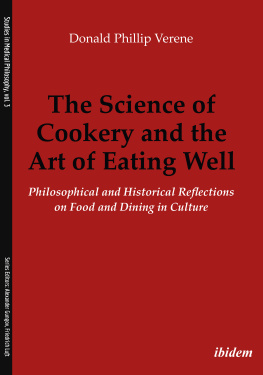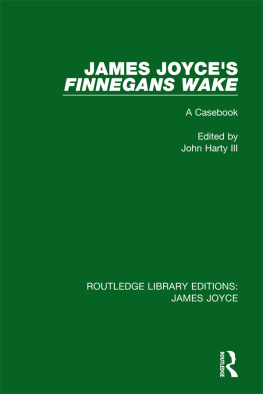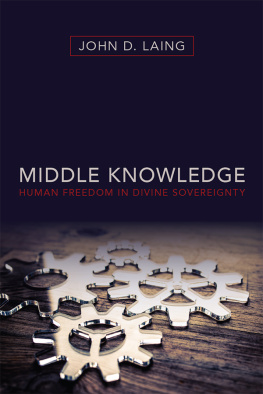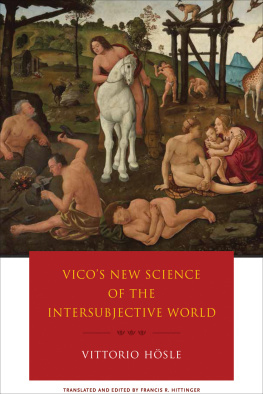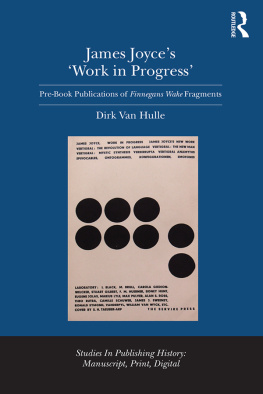Verene - Knowledge of things human and divine: Vicos New science and Finnegans wake
Here you can read online Verene - Knowledge of things human and divine: Vicos New science and Finnegans wake full text of the book (entire story) in english for free. Download pdf and epub, get meaning, cover and reviews about this ebook. City: London;New Haven (Conn, year: 2003;2006, publisher: Yale University Press, genre: Detective and thriller. Description of the work, (preface) as well as reviews are available. Best literature library LitArk.com created for fans of good reading and offers a wide selection of genres:
Romance novel
Science fiction
Adventure
Detective
Science
History
Home and family
Prose
Art
Politics
Computer
Non-fiction
Religion
Business
Children
Humor
Choose a favorite category and find really read worthwhile books. Enjoy immersion in the world of imagination, feel the emotions of the characters or learn something new for yourself, make an fascinating discovery.

- Book:Knowledge of things human and divine: Vicos New science and Finnegans wake
- Author:
- Publisher:Yale University Press
- Genre:
- Year:2003;2006
- City:London;New Haven (Conn
- Rating:3 / 5
- Favourites:Add to favourites
- Your mark:
- 60
- 1
- 2
- 3
- 4
- 5
Knowledge of things human and divine: Vicos New science and Finnegans wake: summary, description and annotation
We offer to read an annotation, description, summary or preface (depends on what the author of the book "Knowledge of things human and divine: Vicos New science and Finnegans wake" wrote himself). If you haven't found the necessary information about the book — write in the comments, we will try to find it.
Verene: author's other books
Who wrote Knowledge of things human and divine: Vicos New science and Finnegans wake? Find out the surname, the name of the author of the book and a list of all author's works by series.
Knowledge of things human and divine: Vicos New science and Finnegans wake — read online for free the complete book (whole text) full work
Below is the text of the book, divided by pages. System saving the place of the last page read, allows you to conveniently read the book "Knowledge of things human and divine: Vicos New science and Finnegans wake" online for free, without having to search again every time where you left off. Put a bookmark, and you can go to the page where you finished reading at any time.
Font size:
Interval:
Bookmark:
Knowledge of Things Human and Divine
True wisdom, then, should teach
the knowledge of divine things
in order to conduct human things
to the highest good.
New Science
a wise and letters play of all
you can ceive
Finnegans Wake
VICOS NEW SCIENCE AND FINNEGANS WAKE
DONALD PHILLIP VERENE

Copyright 2003 by Yale University.
All rights reserved.
This book may not be reproduced, in whole or in part, including illustrations, in any form (beyond that copying permitted by Sections 107 and 108 of the U.S. Copyright Law and except by reviewers for the public press), without written permission from the publishers.
Set in Sabon type by Keystone Typesetting, Inc.
Printed in the United States of America by Sheridan Books.
Library of Congress Cataloging-in-Publication Data
Verene, Donald Phillip, 1937
Knowledge of things human and divine : Vicos new science and Finnegans wake / Donald Phillip Verene.
p. cm.
Includes bibliographical references and index.
ISBN 0-300-09958-4 (alk. paper)
1. Vico, Giambattista, 16681744. Principi di una scienza nuova. 2. Myth. 3. Philosophy. 4. Social sciences. I. Title.
B3581.P73V47 2003
195dc21
2003050052
A catalogue record for this book is available from the British Library.
The paper in this book meets the guidelines for permanence and durability of the Committee on Production Guidelines for Book Longevity of the Council on Library Resources.
10 9 8 7 6 5 4 3 2 1
from Atlanta to Oconee
FW 140.35
This book takes the reader through the career and works of Giambattista Vico (16681744) from a new viewpoint. Two major figures introduced Vico to the twentieth centuryBenedetto Croce and James Joyce. From the mid-twentieth century on there was a growing desire to free Vico from the philosophical idealism of Croce, who in the early part of the century had presented Vico as the Italian Hegel. In the English-speaking world a great step was taken in this new direction by Isaiah Berlin in lectures he gave to the Italian Institute in London in 1957 and 1958, in which he focused attention on Vicos unique conceptions of knowledge and imagination. In Italian thought, the similar concern to conceive of Vico without Hegel was led by Pietro Piovani in Vicos city of Naples. The challenge was not to Croces erudition in Vicos texts but to the Crocean merging of Vicos voice with another, not allowing Vico to speak for himself.
The large international literature that developed from a wide range of scholars during the last half of the twentieth century has shown Vico to be an original thinker whose voice has echoes in all the contemporary fields of the humanities and social thought. This literature oscillates between two approaches: understanding Vico as a figure in intellectual history, examining his sources and influences, and understanding him in philosophical terms, critically assessing Vicos ideas themselves.
There is a third Vico that neither of these two approaches captures. This is the Vico discovered by James Joyce and made the central figure of his great work Finnegans Wake (FW). Joyce reminds us that Vico is a human actuality, a certain spirit to be awakened and brought to life. Through this Vico we are able to see and hear the workings of the human world in a very lively way. Joyce points us toward a unique Vico, a thinker of the first magnitude from whom we can no more steal a line than we can steal the club of Hercules.
From this perspective, Vico is more than just another figure in the history of ideas and more than just another author of a philosophical system. Joyceans, with some exceptions, have given only limited attention to Vico and the Vichianisms in Joyce, usually reporting that Joyce derives his cycles from Vicos. Vichians, with some exceptions, know little about Joyce beyond the fact that he was one of a number of figures influenced by Vico.
I first read Finnegans Wake in 1979 while writing Vicos Science of Imagination in Florence, where I borrowed a copy from the British Institute Library. After pranzo, the full midday meal, I read a few pages of Joyces book of the dark before feeling aslip in my pisolino, my little nap, entering into my daytime nightmaze, to awake from it to the long Italian afternoon. I had no special interest in this experiment beyond a way of reading, in the afternoon, the most unusual book of the twentieth century while, in the morning, writing about the most unusual book of the eighteenth century. I was aware that Vico was a source for Joyce, but I had no grasp of the extent of the connection.
Over the past two decades circumstances have forced Joyce on me as a way to approach Vico. One of these circumstances has been my attempt to confront the ancient quarrel between philosophy and poetry, to comprehend philosophy as a kind of literature. Philosophy is, after all, an activity of language. From Joyces litter comes letter and from letter comes literature. From phaos, light, comes phantasia, imagination, and, in Vicos terms, from phantasia comes philosophia. Neither philosophy nor literature is possible without imagination. Philosophy must go to school with the poets to discover its own beginnings in the myths from which culture itself begins. Philosophy and literature respond to these myths in their own ways and form their own identities as contraries within the wider history of culture.
Another circumstance that led me to Joyce was my association with the Joyce scholar Richard Ellmann, who spent the last few years of his career at Emory. We had a number of luncheon conversations that revolved mostly around Platos quarrel with the poets and around Vico and Joyce. I recall well my first lunch with Ellmann, at a place near campus. He astonished me when he ordered a bowl of chili topped with raw onions and, to drink with it, a glass of scotch with lots of ice. It reminded me of Blooms gorgonzola sandwich at Davy Byrnes Moral pub in Ulysses, on which I had heard Ellmann remark in a lecture given years before. He claimed, if I remember correctly, that Joyce has Bloom make the unusual choice of gorgonzola because it is a kind of cheese that is alive.
My connection with Ellmann led me to consider finding a way to bring together Joyceans and Vichians from various countries to raise the question of the combination of Joyce and Vico. This became a reality when I discovered the interest in Joyce as well as in Vico of Vittore Branca, then director of the Giorgio Cini Foundation, located in the former cloister of the Palladian church on the island of San Giorgio Maggiore, opposite the Piazzetta San Marco in Venicea setting familiar throughout the world because of its depiction on Venetian postcards.
The week-long gathering began there on Bloomsday (June the 16th) in 1985. Sixteen of the papers delivered by Joyceans and Vichians appeared on Bloomsday two years later, in a volume dedicated to Max Harold Fisch, co-translator of Vicos New Science into English, and to the memory of Richard Ellmann, who had died shortly before it appeared. Vico and Joyce remains the only book in print that critically confronts the two thinkers head-on. Many of the other one hundred or so papers that were presented have appeared, to the good of the subject, in various journals. The connection between Joyce and Vico became for me a sleeping giant, only partially awake, like Howth Castle and Environs at the beginning of
Next pageFont size:
Interval:
Bookmark:
Similar books «Knowledge of things human and divine: Vicos New science and Finnegans wake»
Look at similar books to Knowledge of things human and divine: Vicos New science and Finnegans wake. We have selected literature similar in name and meaning in the hope of providing readers with more options to find new, interesting, not yet read works.
Discussion, reviews of the book Knowledge of things human and divine: Vicos New science and Finnegans wake and just readers' own opinions. Leave your comments, write what you think about the work, its meaning or the main characters. Specify what exactly you liked and what you didn't like, and why you think so.

